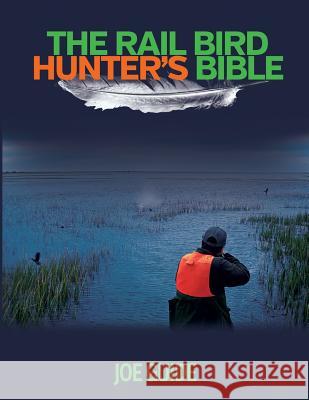Rail Bird Hunter's Bible » książka
Rail Bird Hunter's Bible
ISBN-13: 9781621374527 / Angielski / Miękka / 2014 / 160 str.
In this book, you will find everything you will need to know about hunting rail birds in the United States. The four huntable species are: The Clapper rail (Rallus longirostris), King rail (Rallus elegans), Virginia rail (Rallus limicola) and the smallest: the Sora rail (Porzana carolina). September marks the opening of railbird/marsh hen hunting season across America. Rail birds are webless migratory wildfowl (marsh birds) that migrate in great numbers throughout our flyways each fall from September - December. Each state's Migratory Wildfowl Commission sets the limits and hunt days each year, following the Federal Government's seventy days allowed to hunt rail birds. The limits have consistently been quite liberal, since the bag limits were first set by Federal game laws in 1918, and even today, these are a liberal 25 Sora/Virginia rail per person per day, and 15 Clapper/King rail, or in aggregate, depending on your states specific DNR's rail bird hunting regulations. If you are a keen waterfowler, you'll enjoy the Rail Bird Hunter's Bible Everything you need to know about the history and about hunting rail birds throughout the USA is in this book. All waterfowl hunters will appreciate receiving a copy of the most scholarly hunting book ever written on these rail bird species by the author of -REDFISH ON A FLY- (2007). John J. Audubon called rail bird shooting: -The sport of kings, - as it was a shooting sport primarily done in a traditional method of push poling a light skiff through a flood tide in the Saltmarsh. That traditional hunting method has not changed, since the days of 1831 when as a young man he was invited to hunt rail birds, and observe wildfowl in Charleston, South Carolina. At first he called the King Rails the Freshwater Marsh Hen, because of its preference for freshwater marshes. It is the largest of North American rails. It was in the Charleston brackish salt marshes that Audubon saw a Carolinan being poled in a skiff out rail bird hunting for Clapper rail. The man, who had two muzzle-loaded, side-by-side shotguns, shot at and killed four separate marsh hens as they flushed off around his skiff Read about the history of the four huntable rail bird species, where to find them, and how to hunt them. The author has hunted rail birds for over forty seasons all over the nation, and is the nation's top wildfowl historian, and researcher on hunting rail birds in North America. You will read about ecology of the species, environmental issues, nesting areas, banding programs, and the great fall migration and the hunting season. Read interesting and historical stories about some of the most famous rail bird hunters, shotguns, guides, push poles, retrieving dogs, and rail bird skiffs. See sixty hunting photos and illustrations from around the nation's greatest rail bird flyways and hunting areas, and hunting gear. Did you know that the Sora rail can fly at speed up to 40 mph? However the Virginia, Clapper and King rails fly as fast a quail. Rail birds are best hunted in the traditional manner, which is in a marsh during very high tide (called a rail bird flood tide), and the hunter shoots jumping rail birds from the front of the skiff, while seated in a gunner's chair. The skiff also has a guide or poler, who uses a push-pole from back of the boat to go through a salt marsh or a flooding fresh water rice meadow. In the Atlantic Flyway, rail birds numbering in the millions, migrate throughout the coastal inshore waters, and historic staging, and feeding grounds along the Atlantic and Mississippi Flyways each fall, they are hunted from the months of SEPT-DEC according to the state's DNR-Migratory Bird Committee, which sets the seasons each year by August 1st. Everything you need to know about the education of a rail bird hunter is found in this book, which is the first book ever written on the history of rail bird hunting in America.











